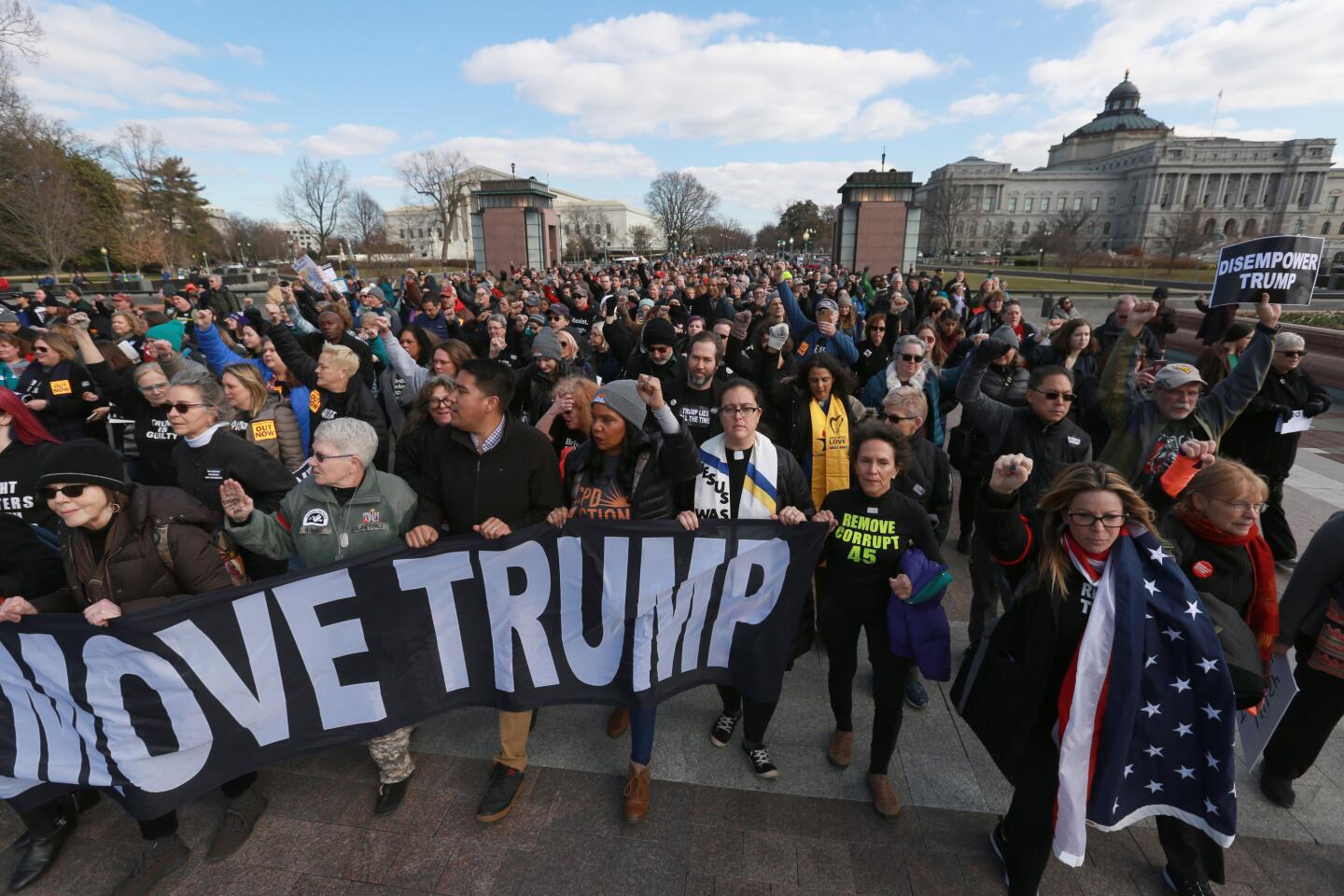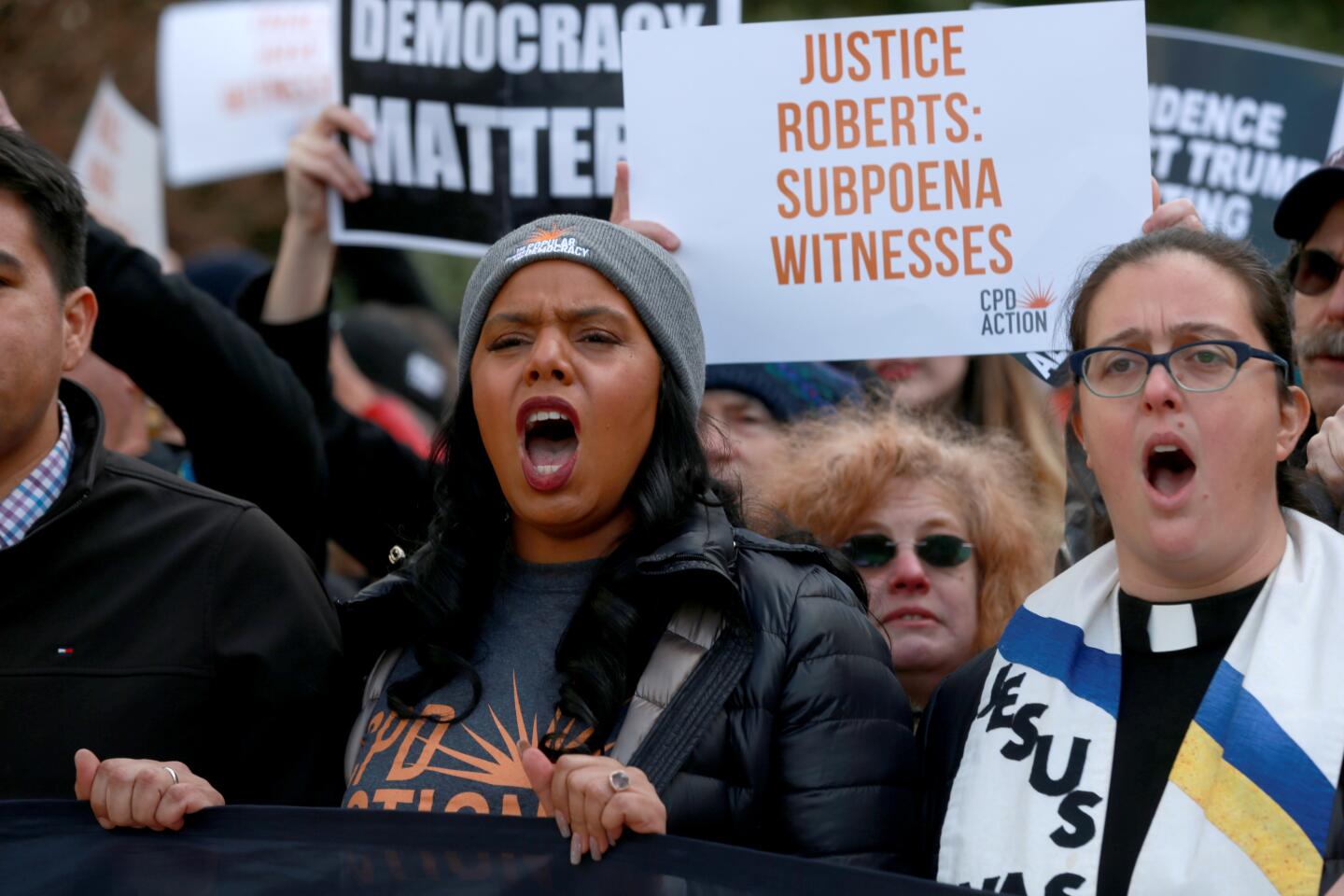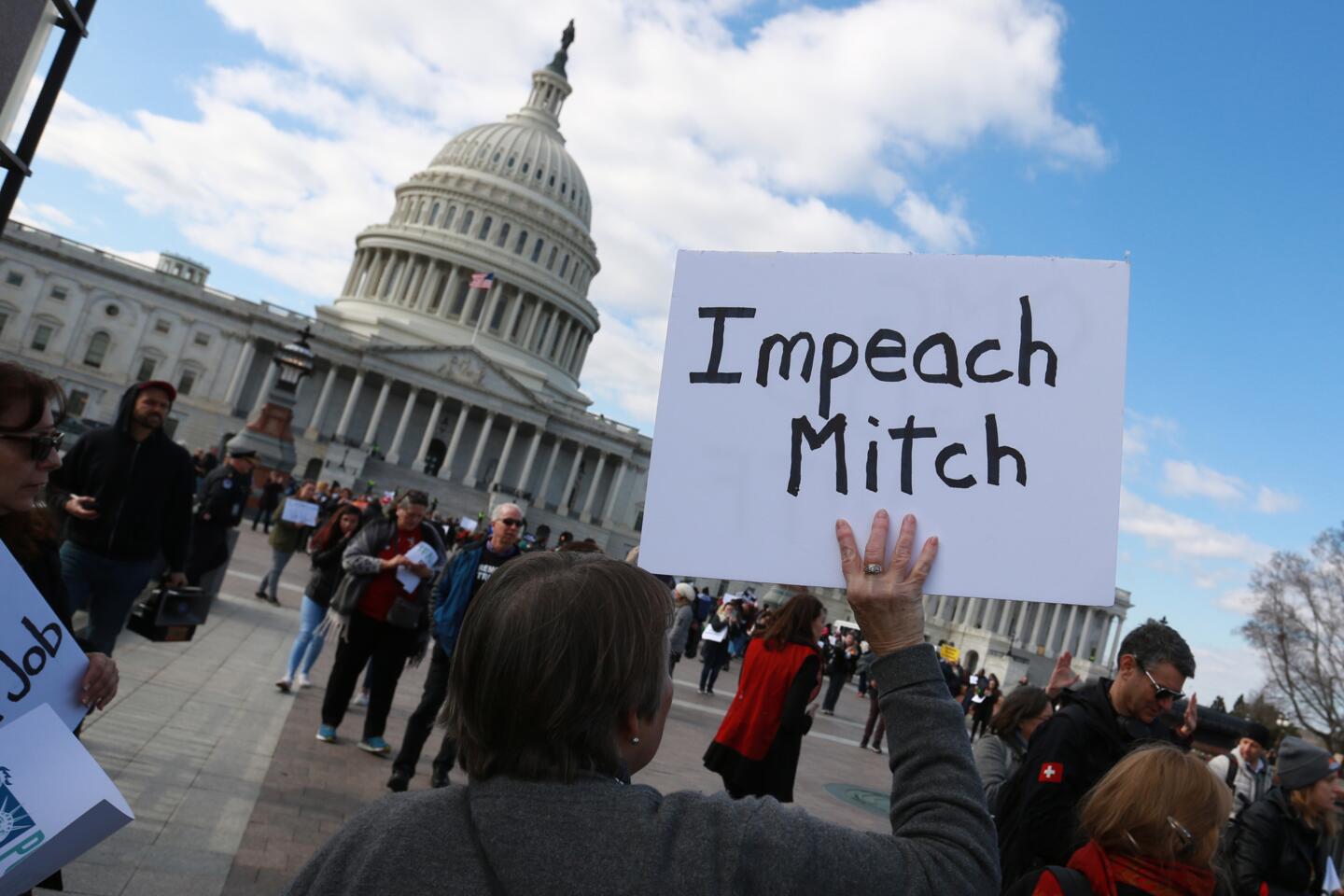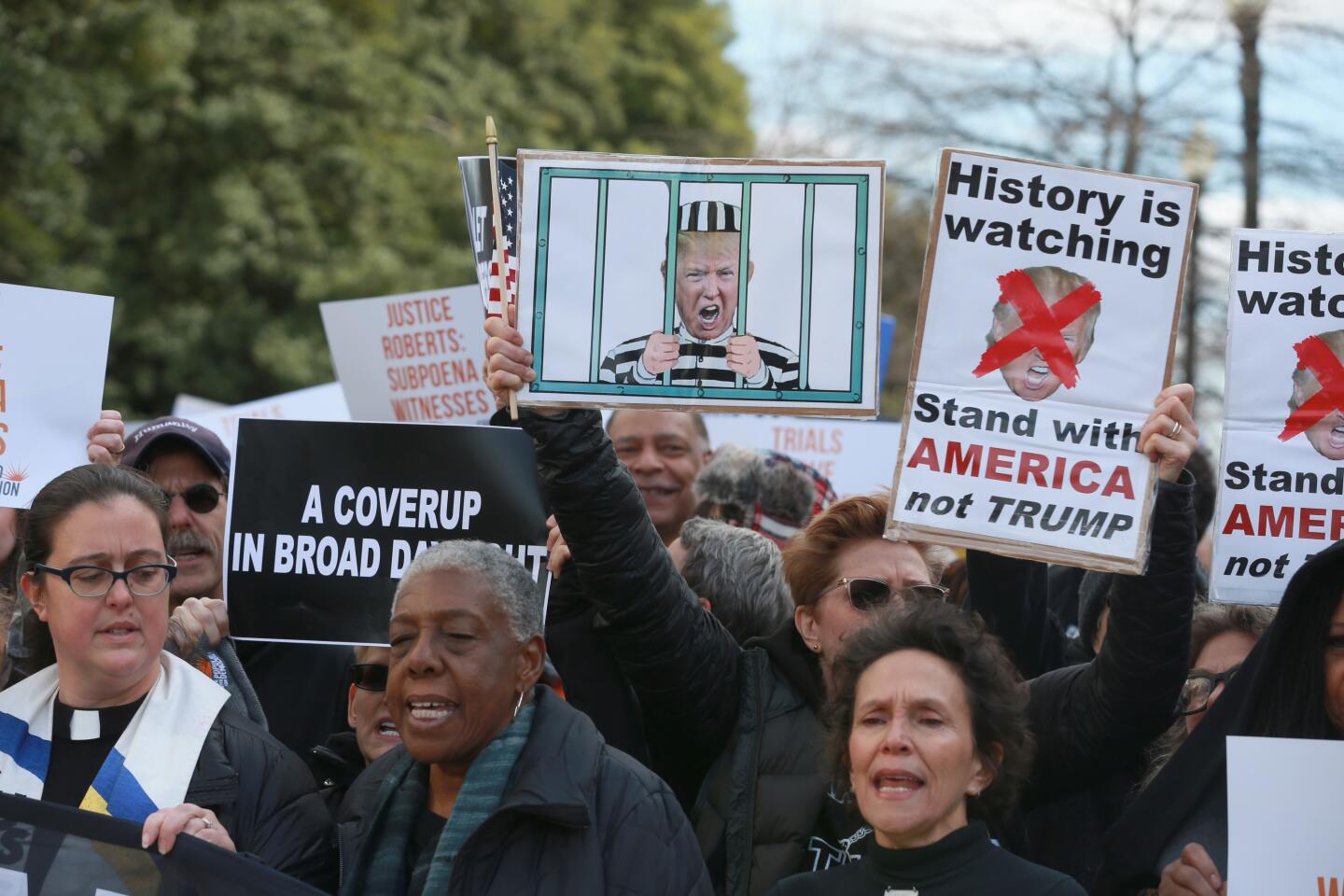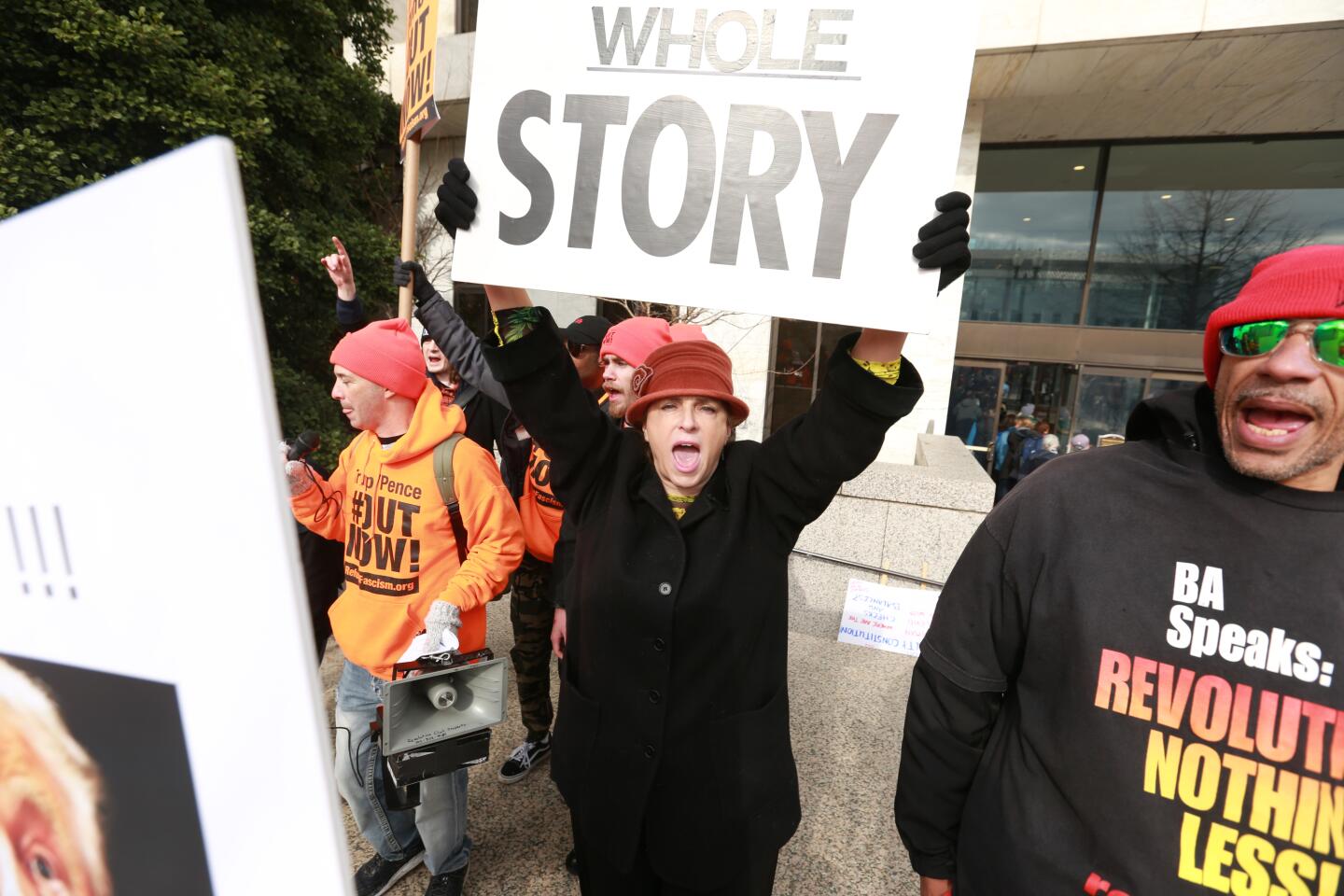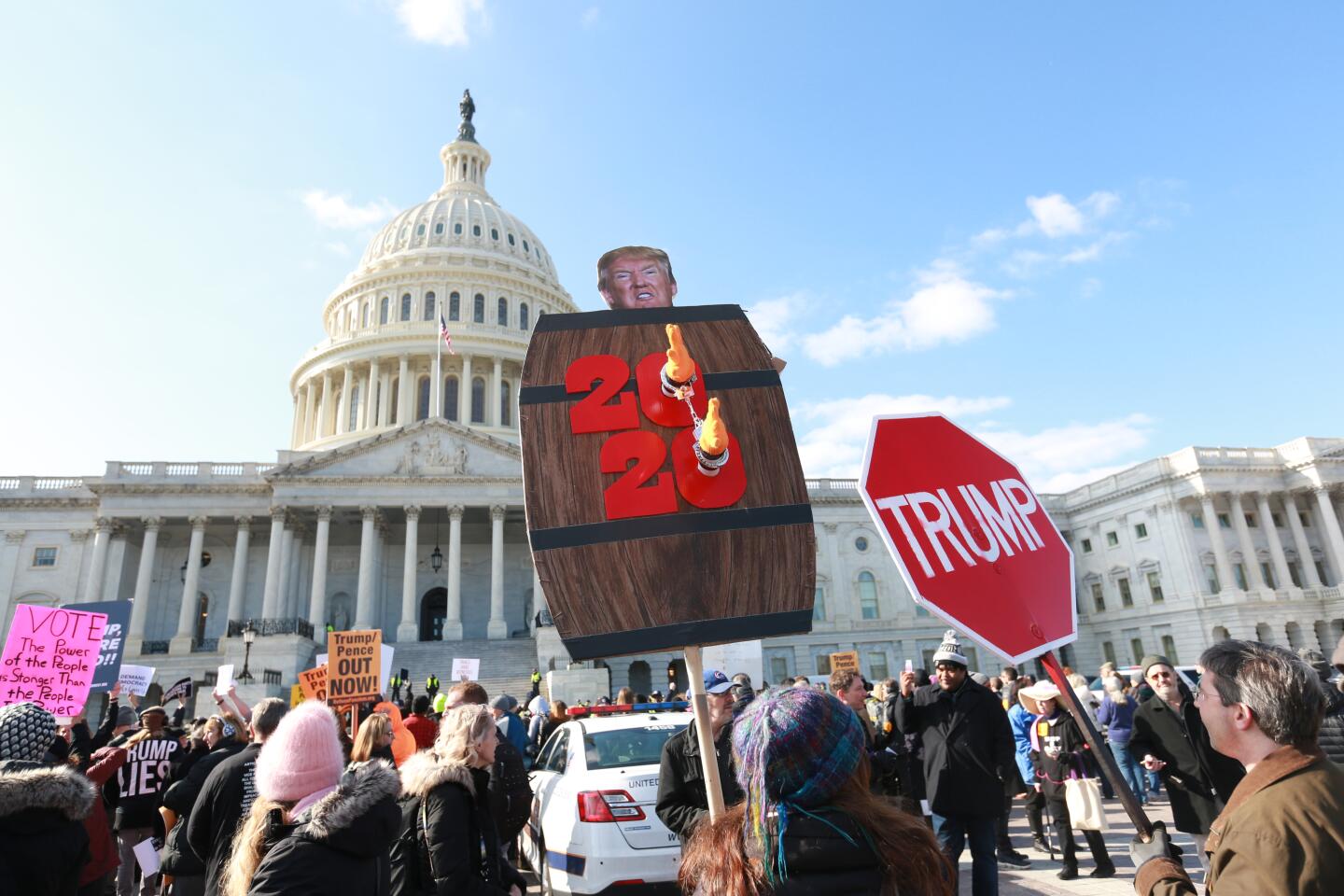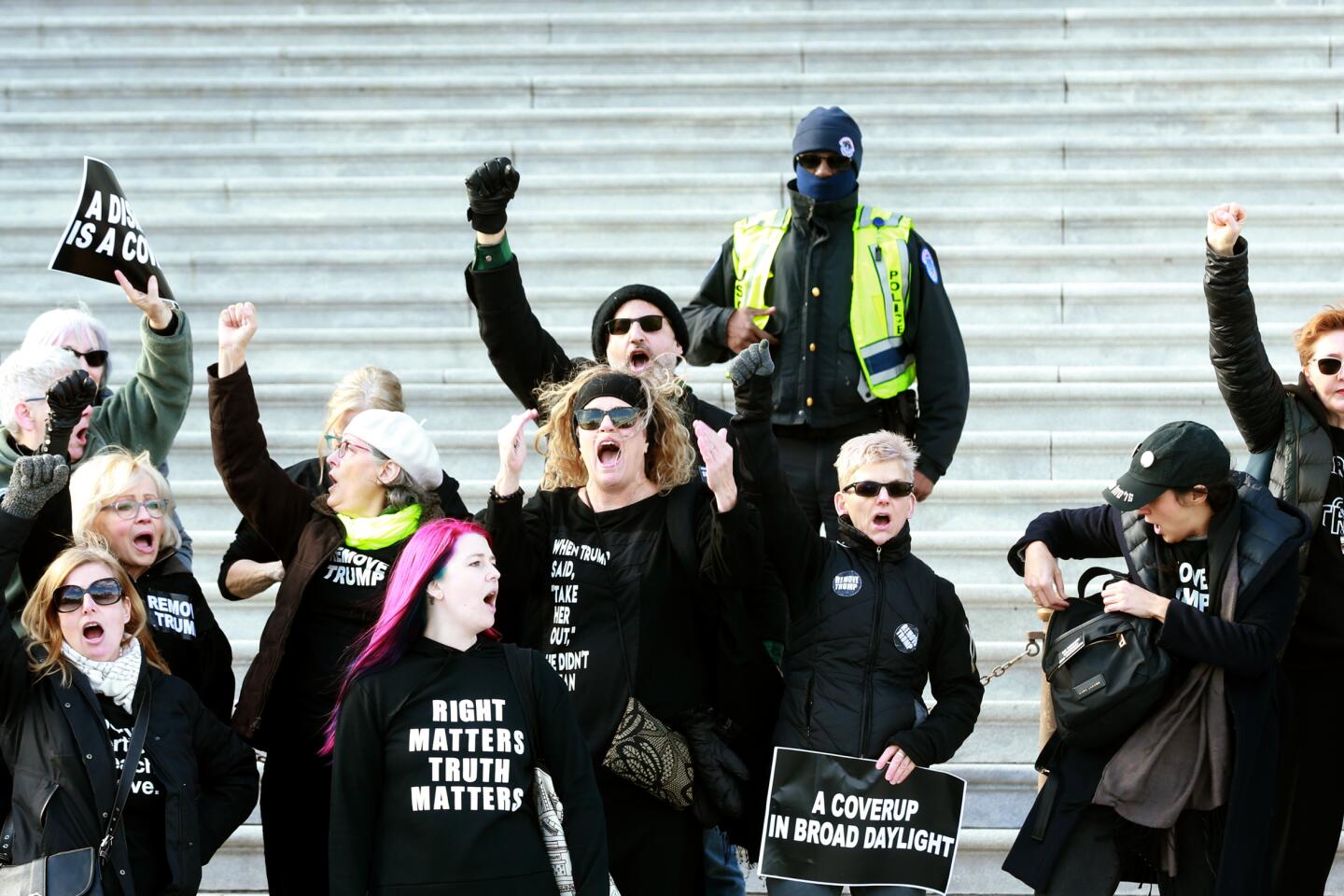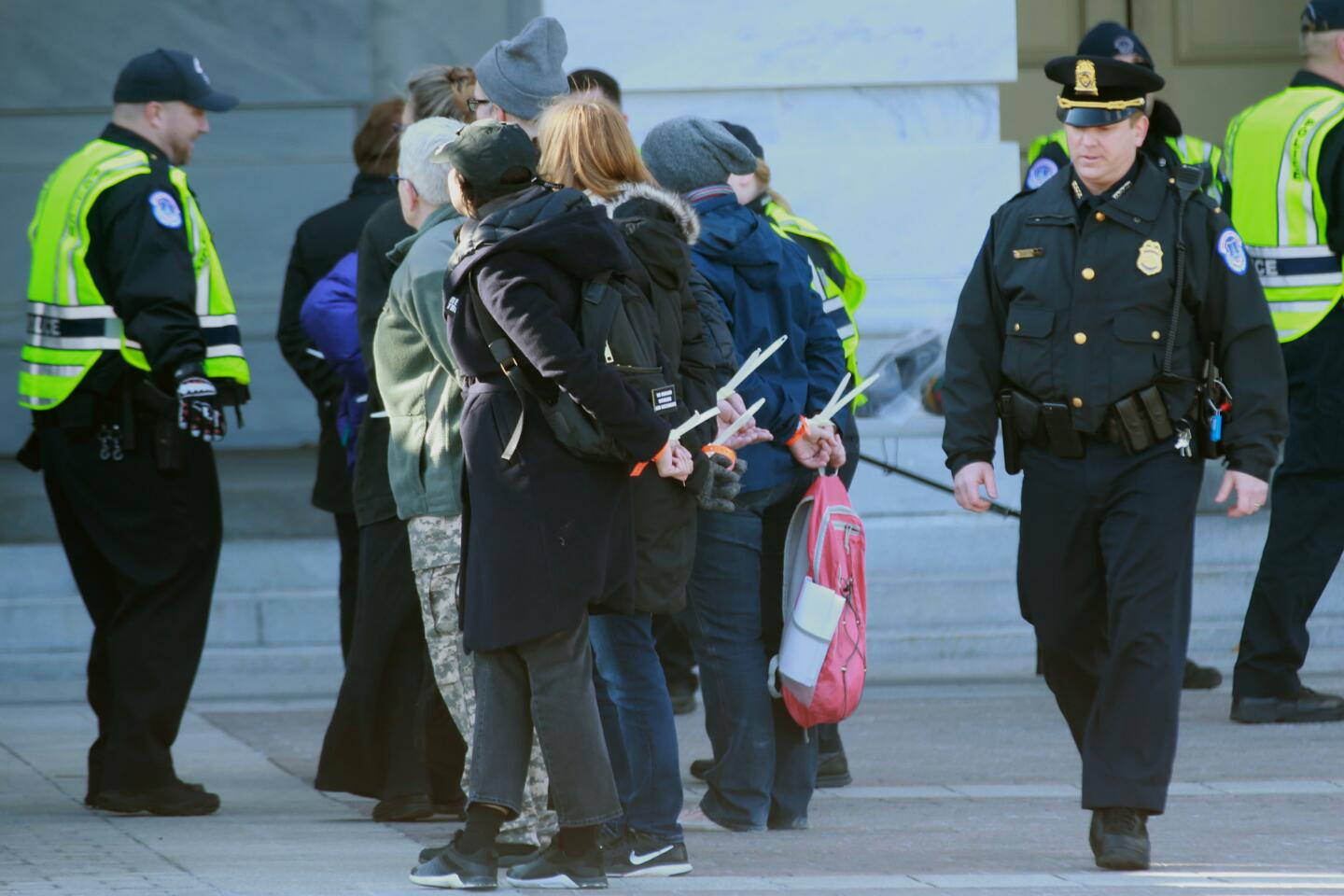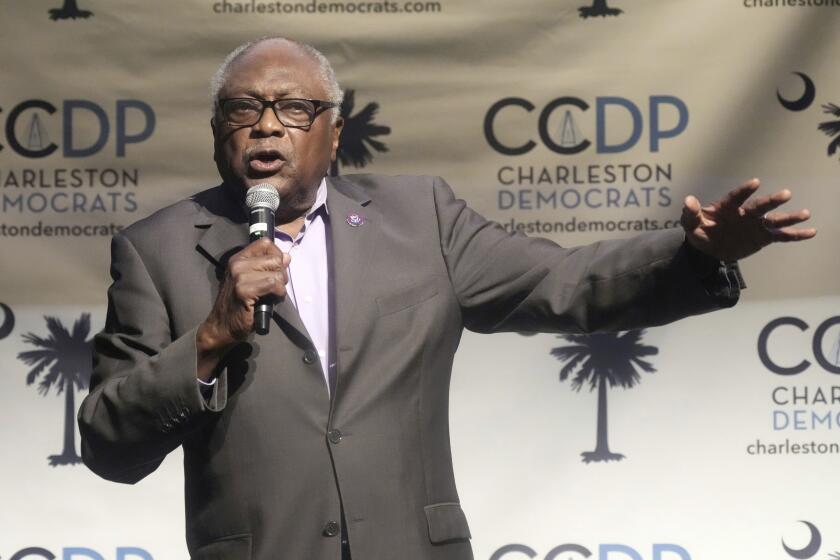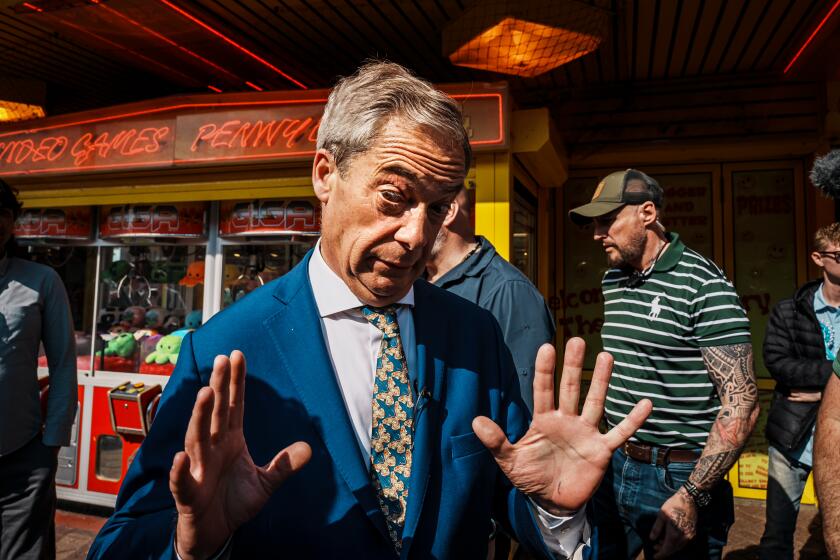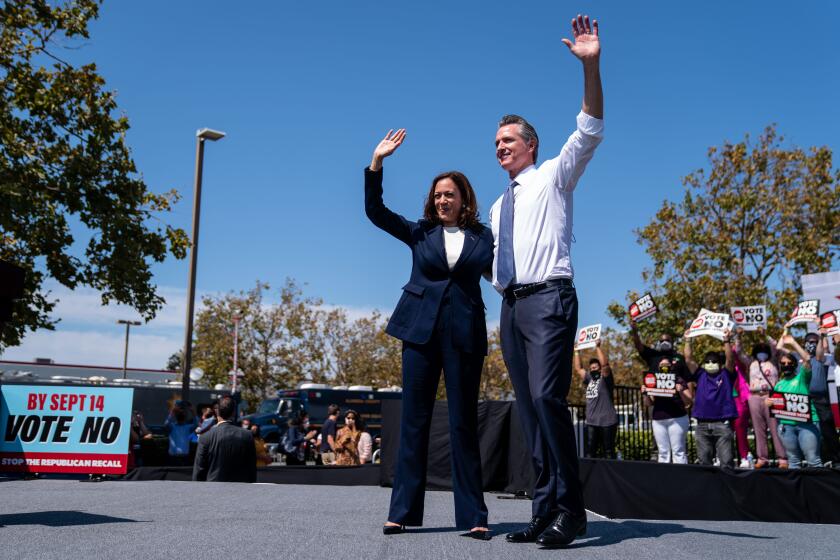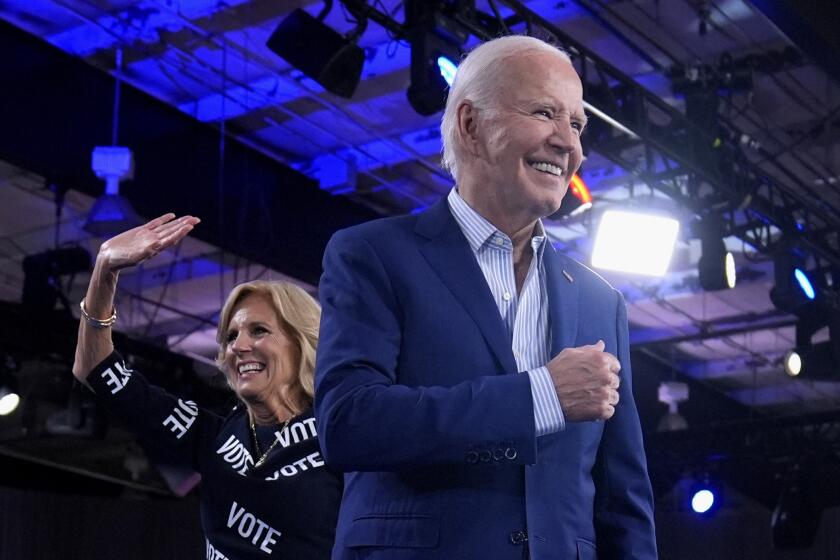GOP optimism grows on blocking witnesses as Democrats focus their questions on what Bolton might know
Former national security advisor John Bolton loomed large in Democratic senators’ inquiries during the question-and-answer phase of President Trump’s impeachment trial Wednesday, but Republicans are increasingly confident that by the end of the week they will have the votes to rebuff calls to subpoena him and other witnesses.
The key question now facing the Senate is whether to move toward an acquittal vote — which some GOP leaders say could take place as early as Friday — or vote to hear additional testimony from Bolton and perhaps others.
It is a question that grew more difficult after the disclosure this week of new allegations in Bolton’s upcoming book. Bolton reportedly writes that Trump told him he would not release nearly $400 million in U.S. aid to Ukraine until it opened investigations into a political rival, former Vice President Joe Biden. That strikes at the heart of the House’s impeachment of Trump.
Rep. Adam B. Schiff (D-Burbank), the lead House impeachment manager, warned Republicans they would risk embarrassment if they declined to hear Bolton’s story when they had the chance, only to find that his book — due out in March — reveals incriminating information about Trump.
“Don’t wait until March 17 when it is in black and white,” he said.
Bolton was the topic of at least eight questions senators asked of both Trump’s lawyers and the House impeachment managers on Wednesday, the first of a two-day marathon Q&A session.
But several Republicans indicated Wednesday that they see no need to hear from Bolton, particularly because he refused to testify in the House impeachment inquiry and House Democrats did not issue a subpoena to compel him.
Sen. John Barrasso of Wyoming, the No. 3 Republican in the Senate, predicted that Republicans will have the votes to defeat Democrats’ demand for witnesses, and suggested Trump’s acquittal could come the same day.
“The momentum is clearly in the direction of moving to final judgment on Friday,” he said. “We still have a couple of members who said they want to listen to answers to questions. But that’s where the momentum is.”
Democrats would need to persuade four Republicans to cross the aisle and vote with them to subpoena witnesses and start a debate over who should testify.
“We’ve always said this is an uphill fight,” said Senate Minority Leader Charles E. Schumer (D-N.Y.). “But I am hopeful we can get witnesses and documents.”
Although two Republicans — Sens. Mitt Romney of Utah and Susan Collins of Maine — have indicated they are likely to want to hear from Bolton, it is unclear whether there will be two additional GOP votes. Sen. Lisa Murkowski of Alaska, a third potential vote for witnesses, met with Senate Majority Leader Mitch McConnell (R-Ky.) on Wednesday morning, but demurred on disclosing her position.
“I am not going to be discussing the witness situation right now,” she said. “I’ve got some more questions that I want to get into the mix. So I’ve been talking with the folks in the cloakroom about what the universe is to see how we can supplement that.”
Other Republicans are deeply skeptical of opening the door to witnesses, arguing that additional testimony could significantly delay the trial and won’t change the expected acquittal of the president. Sen. Cory Gardner (R-Colo.), who is facing perhaps the most difficult reelection of any Senate Republican this year, told Colorado Politics that he wouldn’t support the vote for witnesses. Sen. Patrick J. Toomey (R-Pa.) said he was “very, very unlikely” to support the measure.
But as the trial approaches what could be the final days, there’s been a drip of new disclosures, most recently coming Wednesday when House Foreign Affairs Committee Chairman Eliot L. Engel (D-N.Y.) disclosed for the first time that on Sept. 23 — not long after Bolton left his White House post — Bolton suggested that Engel’s committee look into the recall of former U.S. Ambassador to Ukraine Marie Yovanovitch.
“He strongly implied that something improper had occurred around her removal as our top diplomat in Kyiv,” Engel said.
The House impeachment inquiry concluded that Yovanovitch was pushed aside because she was viewed as a threat to schemes being planned by Trump loyalists.
The revelation from Engel was designed to push back on the idea that Bolton hadn’t previously raised questions about Trump’s behavior. Engel said he found it important to release the detail now to set the record straight because Trump has “called [Bolton’s] credibility into question.” Trump tweeted Wednesday that Bolton wrote a “nasty & untrue book. All Classified National Security.”
Bolton’s attorneys and the White House are engaged in a battle over whether the book contains classified material that would prevent its publications. Bolton’s attorneys say it does not and are pressing the National Security Agency to specify exactly what parts are of concern.
During the Q&A session Wednesday, Democrats and Republicans took turns submitting written questions to Chief Justice John G. Roberts Jr., who read them aloud and enforced a five-minute limit on answers from House managers and Trump attorneys. Generally, the questions were more revealing than the answers, which hewed to previously stated partisan positions.
Senators asked a total of 93 questions over eight hours, nearly matching the approximately 106 questions asked during the trial of President Clinton.
But with only a few exceptions, senators lobbed softballs at their own side of the aisle, allowing lawyers to revisit past arguments and rebut the other party’s positions.
Democrats hammered away at the White House’s refusal to comply with House subpoenas, suggesting that the president’s decision to prohibit testimony from those close to him revealed the weakness of his case. Without witnesses, asked Sens. Benjamin L. Cardin (D-Md.) and Edward J. Markey (D-Mass.), would “a reasonable judge conclude these proceedings constitute a constitutionally fair trial?”
Republicans wanted to know more about the time Hunter Biden, the former vice president’s son, was on the board of the Ukrainian gas company Burisma, which has faced allegations of corruption although there is no evidence Hunter Biden did anything illegal. Republicans also asked three questions about the whistleblower report that started the investigation into the administration’s activity in Ukraine.
Sen. Rand Paul (R-Ky.) was blocked by Roberts from asking a question that would have identified the whistleblower by name, according to a CNN report. Paul indicated that he may try to find a way to ask the question. It was one of the most substantive rulings so far by Roberts, who has largely limited his activities to procedural responsibilities.
Perhaps the most revealing questions came from the trio of Republicans considered to be potential swing votes on whether to call witnesses, Collins, Romney and Murkowski.
They asked the president’s lawyers what would happen in the event senators concluded that the president had more than one motive in asking Ukraine to investigate the Bidens — a personal political reason, as Democrats claim, and another rooted in the national interest, such as addressing Ukraine’s corruption, as Republicans have argued.
Patrick Philbin, deputy counsel for the president, said that as long as there was a possibility of a public concern, that “destroys” the House’s case.
Trump lawyer Alan Dershowitz took that argument a step further, suggesting that because every president believes his or her reelection would be in the national interest, anything the president does to get reelected could be considered motivated by national interest and therefore not be impeachable, a comment that drew rebuke from Democrats.
“He made absolutely no sense because he essentially said that if President Trump believes his election is for the good of the American people that he could do whatever he wants,” said Sen. Kirsten Gillibrand (D-N.Y.). “He’s made a laughable argument that undermines the president’s case.”
Murkowski also quizzed lawyers on what the evidentiary bar should be. “Preponderance of the evidence? Clear and convincing? Beyond a reasonable doubt?” she asked, reciting standards of proof used in courtrooms across the country but that have little application in the Senate chamber.
More to Read
Get the L.A. Times Politics newsletter
Deeply reported insights into legislation, politics and policy from Sacramento, Washington and beyond. In your inbox three times per week.
You may occasionally receive promotional content from the Los Angeles Times.
